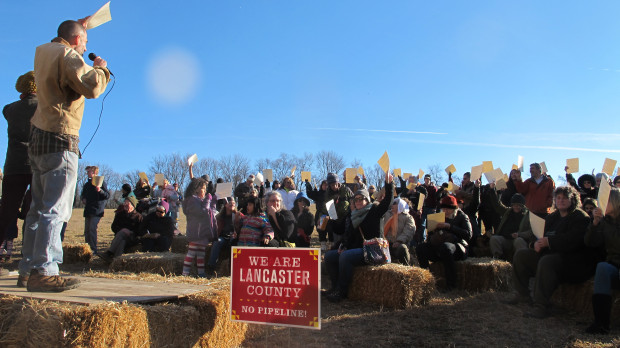Atlantic Sunrise pipeline opponents begin encampment

Marie Cusick / StateImpact Pennsylvania
Protesters gathered in January to ceremonially burn the environmental impact statement for the Atlantic Sunrise pipeline.
Opponents of the Atlantic Sunrise natural gas pipeline are officially launching an encampment in Lancaster County this weekend.
The pipeline was approved by federal regulators earlier this month, although it still awaits permits from the state Department of Environmental Protection and U.S. Army Corps of Engineers. Williams, the company behind the project, expects construction to begin in the second quarter of this year, with the pipeline coming online by mid-2018. It has already begun condemnation efforts to obtain rights of way and temporary easements.
The $3 billion dollar pipeline is designed to carry Marcellus Shale natural gas southward to markets along the east coast and to an export terminal near the Chesapeake Bay. It will go through 10 Pennsylvania counties, but the most intense opposition has come from Lancaster.
Activists built two wooden structures near Conestoga, which they will occupy in an effort to disrupt construction.
On Friday afternoon, a Facebook page for this weekend’s camp out showed 26 people attending, while another 107 expressed interest. Protesters from other states, including groups involved with the Standing Rock Sioux Tribe’s protest against the Dakota Access line, have also voiced support.
“Outsiders are fine, we want them too,” says activist Tim Spiese. “But I’m feeling more confident that we’ll have a lot more local grassroots people than expected.”
He says the group Lancaster Against Pipelines recently met with local law enforcement to explain its plans for nonviolent direct action.
“They’re reaction was, ‘We completely understand,'” says Spiese. “And they said, ‘We will uphold the law.”
“We respect peoples’ right to protest, as long as those protests are done peacefully and safely,” Williams spokesman Chris Stockton says in an email. “We will use the full measure of the law working with local, state and federal authorities to ensure that protestors and our construction personnel remain safe during construction activities.”
Stockton says many who oppose the project are also against the expanded use of natural gas, but he points out that it is a flexible fuel source that can help the grid support more renewable energy.
“States’ ability to incorporate more wind and solar energy into their power mix is dependent on natural gas combined cycle turbines that will quickly and cost-effectively pick up the slack when the sun doesn’t shine or the wind doesn’t blow,” he says.
















